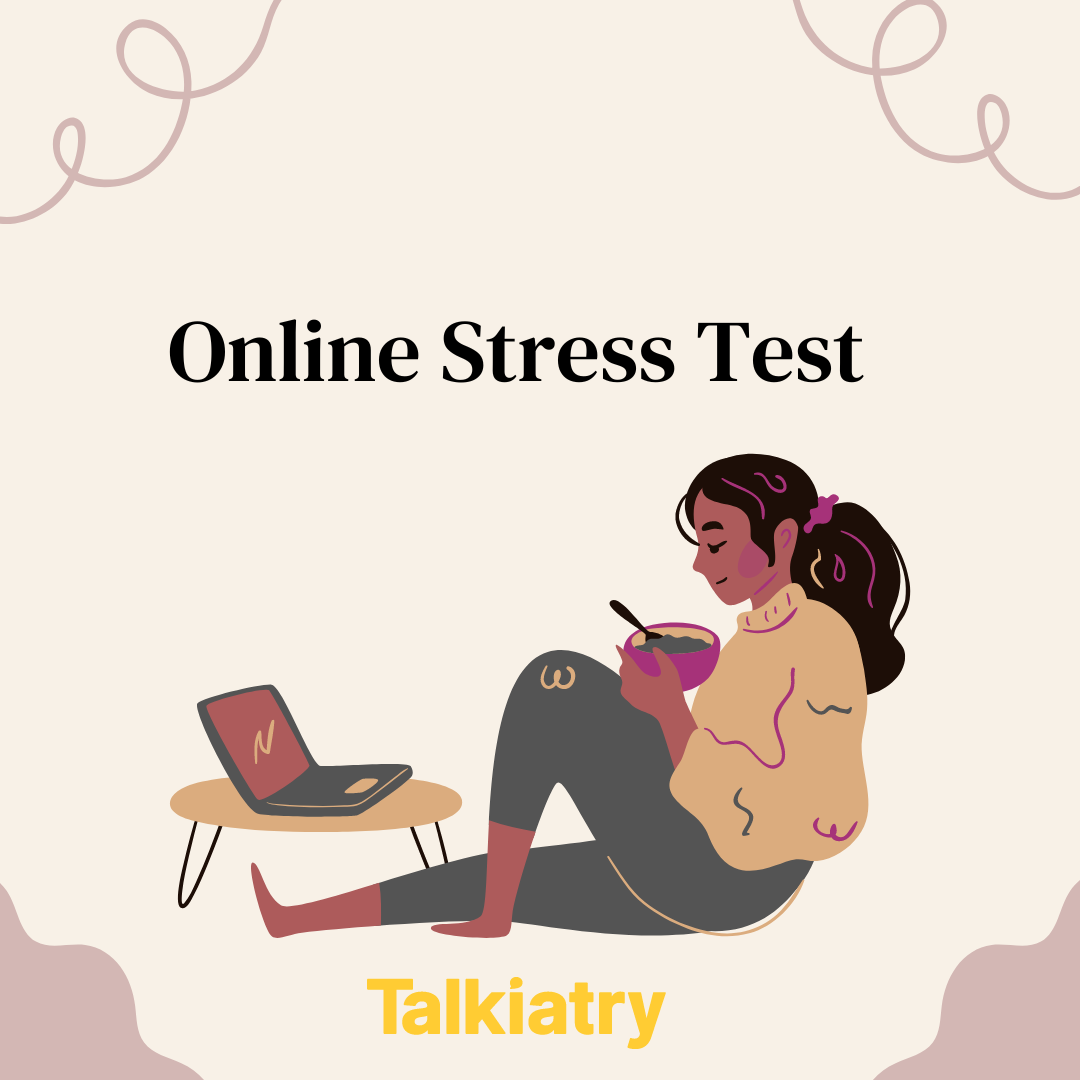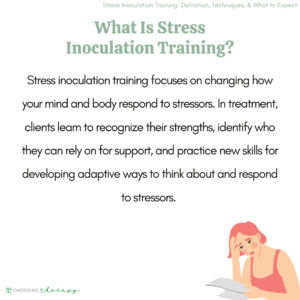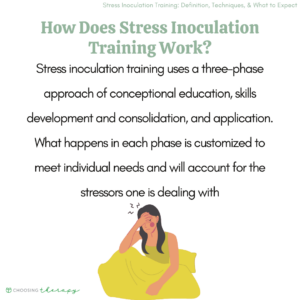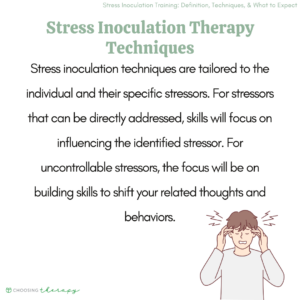Stress inoculation training is a therapeutic intervention that aims to “inoculate” or protect people from future stressors. Like traditional CBT, stress inoculation focuses on shifting negative bodily and mental reactions to stressors, helping the person cope with and manage difficult emotions. Specifically, this approach has been used successfully to help individuals cope with post-traumatic stress disorder (PTSD), anxiety, medical treatments, performance anxiety, and ongoing medical conditions.1
Lower Your Stress & Avoid Burnout!
Therapy can help. BetterHelp has over 20,000 licensed therapists who provide convenient and affordable online therapy. BetterHelp starts at $65 per week. Take a Free Online Assessment and get matched with the right therapist for you.
What Is Stress Inoculation Training?
Stress inoculation training, also called stress inoculation therapy, is a type of cognitive behavioral therapy (CBT) that focuses on changing how your mind and body respond to stressors. In treatment, clients learn to recognize their strengths, identify who they can rely on for support, and practice new skills for developing adaptive ways to think about and respond to stressors. For those with PTSD, stress inoculation training might be offered on its own or in conjunction with other types of trauma therapy, like prolonged exposure therapy.2
Stress inoculation training teaches individuals to better cope with and manage distress from specific stressors. This approach proposes that individuals are better prepared to deal with any stressors that may arise by improving their confidence through flexible and effective coping skills.1
Is Stress Inoculation Training Effective?
Stress inoculation training can effectively prepare individuals to deal with stressors because it helps them change how they think about these events, thus affecting how they emotionally and physically respond.
Pre-deployment stress inoculation training has also shown promise in protecting soldiers against developing PTSD from exposure to combat.12 More research is needed to understand what specific components of stress inoculation are responsible for observed improvement.13 More specifically, studies on targeted stressors and how much exposure to these stressors is needed for change can help provide further insight into the efficacy of this approach.
Stress inoculation therapy can help treat issues such as:
- Anxiety in children undergoing painful medical procedures3
- Anxiety disorders4
- Stress, anxiety, and depression among cancer patients5
- Performance anxiety (e.g., test anxiety, musical performance, etc.)6
- Sports performance anxiety7
- PTSD among sexual assault survivors and physical assault survivors8,9
- Military veterans with PTSD, anger issues, or depressive symptoms10,11
How Does Stress Inoculation Training Work?
Stress inoculation training is based on the premise that shifting attitudes and behavior protect individuals from subsequent, more intense stressors. Clients also receive training for developing more effective coping and problem-solving skills.1 This training is tailored to meet individual needs and circumstances and is often used to supplement other types of trauma therapy if being used to treat PTSD.1,2
Stress inoculation training uses a three-phase approach of conceptional education, skills development and consolidation, and application.1 What happens in each phase is customized to meet individual needs and will account for the stressors one is dealing with.
The three phases of stress inoculation training for PTSD are:
1. Conceptual Education Phase
During this phase, the therapist provides education on stress or PTSD and coping.1 They will help you identify stress-related concerns, coping strengths, supports, and challenges. Together, you determine which aspects of the stressful situations identified are within your control to change.
In some cases, you might be able to deal with the stressor directly by influencing change in the external situation itself. In other cases, you work with the therapist to deal with them indirectly by changing how you respond to them through your thoughts and behaviors.
This first phase helps you clarify what specific factors are causing your distress and identify and mobilize your supports and strengths (within areas you can control) to leverage them more effectively. This increased understanding of why you are experiencing distress and how you can enhance your coping abilities can increase hope and a sense of empowerment.
2. Skills Development & Consolidation Phase
The second phase of stress inoculation therapy involves building upon your current coping skills and learning new ones tailored to your needs. Some coping skills might focus on problem-solving (e.g., assertiveness and using social supports), while others center on coping with your emotions (e.g., emotional regulation and reframing how you look at a situation).
You will be asked to practice these skills in session by imagining the situations where they might be needed. You will also be encouraged to use these skills in your daily life. Skills development helps you notice, refine, and develop confidence in your coping skills, enhancing your understanding of how these might be generalized to deal with different stressors. With this increased ability to respond to stressors, you will likely feel a greater sense of control.
3. Application Phase
In this last phase, you continue to practice and become confident in using your coping skills, both in session and in daily life.1 Your therapist will encourage you to use these coping skills in more stressful situations. The application phase will also focus on problem-solving to prevent relapse.
When you have developed confidence in your coping abilities, you will end treatment but will be invited to come in for a “booster” session at some point to check on progress and address any challenges. As you experience success in dealing with incrementally more stressful situations, you will no longer need ongoing treatment.
Top Rated Online Therapy Services
BetterHelp – Best Overall
“BetterHelp is an online therapy platform that quickly connects you with a licensed counselor or therapist and earned 4 out of 5 stars.” Visit BetterHelp
Online-Therapy.com – Great Alternative
In addition to therapy, all Online-Therapy subscriptions include a self-guided CBT course. Visit Online-Therapy.com
Stress Inoculation Therapy Techniques
Stress inoculation techniques are tailored to the individual and their specific stressors. For stressors that can be directly addressed, skills will focus on influencing the identified stressor. For uncontrollable stressors, the focus will be on building skills to shift your related thoughts and behaviors.
Dealing Directly With the Stressor
Sometimes, the stressor is based on a relationship or life situation you might be able to influence. However, when other people are involved, they choose their reactions, no matter how skilled you are. We cannot change someone’s behavior or beliefs, but we can skillfully approach the situation.
Below are skills to directly deal with stressors:
- Assertiveness skills: You will be taught how to respectfully and assertively (not aggressively) express your needs and wants in a relationship. You will also learn to tell someone if their behavior is unwelcome, how their behavior affects you, and what you want/need from them instead.
- Problem-solving skills: Your therapist will help you learn to identify a problem and the resources available to support you in solving a problem. You will learn to generate and evaluate possible solutions to decide which one to pursue.
- Conflict resolution skills: Assertiveness skill training is often part of conflict resolution skills training. In conflict resolution training, you might also be taught emotional de-escalation skills and how to use reframing skills.
Dealing Indirectly With the Stressor
Some stressors in life cannot be dealt with directly. In these cases, focus on skills that decrease your internal emotional and physical distress by changing your thoughts and/or behaviors.
Below are skills to indirectly deal with stressors:
- Breathing exercises: Learning breathing exercises, such as diaphragmatic breathing, can help recenter you and reduce emotional distress. Breathwork is a mindfulness exercise that can help you calm your mind and body and anchor yourself in the present moment. This can be particularly helpful for those with PTSD as it can stave off PTSD dissociation and pull you out of PTSD flashbacks (reliving the trauma).
- Relaxation training: Like breathing exercises, muscle relaxation training can help reset the mind and body. If you are in a constant state of tension due to the stressors in your life, this training can allow your body to relearn how to relax. Relaxation training can be particularly beneficial for those with PTSD.
- Changing self-talk: We all carry on an internal dialogue with ourselves throughout our day. Depending on the content of those dialogues, we influence our level of stress and distress, either positively or negatively. Becoming aware of your self-talk and learning how to slant it in a more compassionate and hopeful way can make a significant difference in your physical and emotional well-being.
How to Find a Therapist Who Provides Stress Inoculation Training
Many therapists who provide CBT also utilize a stress inoculation training/therapy approach (although they might not specifically call it that). Ask a therapist if they take a similar approach to stress inoculation training. Also, you might want to look for a therapist specializing in both areas if considering a therapist to provide stress inoculation training to treat PTSD.
If you have health insurance, check with your provider to find out what mental health professionals are in-network (e.g., psychologists, professional counselors, social workers, etc.). States that license their mental health professionals might provide online directories of these providers. You can start finding the right therapist with an online therapist directory.
What to Expect at Your First SIT Appointment
Stress inoculation therapy is tailored to meet individual needs. Some will require multiple sessions, while others might only need one session. During your first appointment, your therapist will typically provide information on stress/PTSD and coping. You will work together to identify the stressors causing your distress and the strategies you use to cope with them.
As time passes, you will be taught and provided opportunities to practice new problem-solving and coping strategies in session. Then, you will be encouraged to practice at home. These strategies will focus on changing how you think about and respond to identified stressors (physically and emotionally).
Final Thoughts
Dealing with PTSD or anxiety can be overwhelming, but stress inoculation therapy can provide some relief. No one type of therapy is the answer for everyone, but this therapy can help some individuals enhance their chopping strategies and significantly reduce distress.
Additional Resources
To help our readers take the next step in their mental health journey, Choosing Therapy has partnered with leaders in mental health and wellness. Choosing Therapy is compensated for marketing by the companies included below.
Talk Therapy
Online-Therapy.com – Get support and guidance from a licensed therapist. Online-Therapy.com provides 45 minutes weekly video sessions and unlimited text messaging with your therapist for only $64/week. Get Started
Virtual Psychiatry
Hims / Hers If you’re living with anxiety or depression, finding the right medication match may make all the difference. Connect with a licensed healthcare provider in just 12 – 48 hours. Explore FDA-approved treatment options and get free shipping, if prescribed. No insurance required. Get Started
Anxiety Newsletter
A free newsletter from Choosing Therapy for those impacted by anxiety. Get helpful tips and the latest information. Sign Up
Learn Mindfulness, Meditation, & Relaxation Techniques
Mindfulness.com – Change your life by practicing mindfulness. In a few minutes a day, you can start developing mindfulness and meditation skills. Free Trial
Choosing Therapy Directory
You can search for therapists by specialty, experience, insurance, or price, and location. Find a therapist today.
Online Stress Test A few questions from Talkiatry can help you understand your symptoms and give you a recommendation for what to do next. Best Online Therapy Services There are a number of factors to consider when trying to determine which online therapy platform is going to be the best fit for you. It’s important to be mindful of what each platform costs, the services they provide you with, their providers’ training and level of expertise, and several other important criteria.








